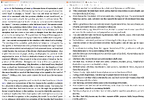So I am an old school Bible software user going back to Wordsearch Bible (when it was its own company), Quickverse and Logos. While Logos had gobbled everyone up I just don't care anything for it. I have a ton of books in Logos 4 with the free Logos 9 patch and have spent 1K for the platinum version back in the day. Now you have to watch videos just to figure out how to use it or it may be indexing for the next 3 weeks.
I know about SwordSearcher and others like it but is there any software out there that gives any competition to Logos or could even remotely rival it?
Please don't hate on me if you happen to love Logos. If so, good for you. I just don't.
I know about SwordSearcher and others like it but is there any software out there that gives any competition to Logos or could even remotely rival it?
Please don't hate on me if you happen to love Logos. If so, good for you. I just don't.

